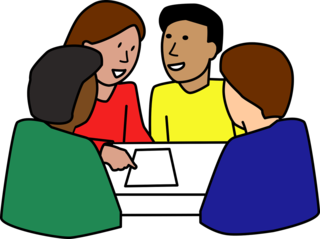Ilene Berns-Zare PsyD
Thoughts for those wondering what they can do.
KEY POINTS
- Cultural competence is the ability to understand, appreciate, and interact with people from a different culture or belief system.
- Building multicultural competence and combating racism require systematic shifts at individual and societal levels.
- Some ways to build multicultural competence include examining old beliefs, beginning to learn from where you are today, and talking to your kids.

Source: Open Clip Art – Vectors / Pixabay
With all the reports of racism on the news and across the U.S., many of us are wondering what we can do about it.
First, let’s acknowledge that learning about diversity, racism, and cultural competence can be difficult. Cultural competence involves “the ability to understand, appreciate, and interact with people from a culture or belief system different from one’s own” (DeAngelis, 2015).
I am not an expert on diversity, inclusion, or promoting social justice. I am a learner. I’m working to increase my awareness and understanding. And I am learning a lot, including that the increasing diversity of today’s U.S. population and the devastating consequences of hate and racism require a wide-awake, multi-faceted response to promote greater diversity, inclusion, and equity. I am learning that to reduce hate and inequity we need to understand them.
Racism, inequity, and hate are thriving in America.
In a country in which so few consider themselves racist, this may be a controversial statement. Racism creates false hierarchies of advantage and human value affecting the way we treat people – based on skin color, ethnicity, gender, age, religion, gender identity, or body type. According to Ibram Kendi (2019), a racist supports racist policies through action, inaction, or by supporting racist ideas.
The U.S. has always been a country populated primarily by immigrants and their descendants, whether they arrived recently or centuries ago (Brookings Institution, 2021). As a country and as individuals, Americans are deeply affected by racism and the profound effects of marginalizing others. Slavery and racism date back to the foundation of the country and are central to its DNA, and the lens through which we see the world (Hannah-Jones, 2019).
Whether we acknowledge these issues or ignore them, whether we actively perpetrate racism or passively stand by, there are real costs for all of us and for future generations – psychosocial, political, economic, and in terms of access to education, workplaces, resources, and opportunities (Andoh, 2021; Roberts & Rizzo, 2020).
It’s hard to let go of long-held beliefs and behaviors. Racism is not inborn; it is learned, and is “a culmination of factors that are deeply woven into the fabric of U.S. society” (Roberts & Rizzo, 2020). If we don’t shift as individuals, communities, and as a society to reverse current trends, we risk perpetuating inequities and harm to future generations, whether through our actions or our silence.article continues after advertisement
RELATED: WHY DO WE HATE
How can individuals and communities transform the widespread and damaging effects of racism? I don’t have the answers, but here’s what I’m learning: Tackling racism is a process that must be addressed at every level of society. If we keep looking out there for other people to fix it, we’ll never create meaningful systemic change. To form a more just and equitable society, we need to liberate ourselves and each other from racism at the micro level – as individuals – and at the macro level – addressing pervasive systemic biases including laws, institutions, governmental units, educational systems, and workplaces.
Tackling racism is an opportunity to fully engage with humanity — to treat other people as we want to be treated. Many traditions, including Christianity, Judaism, Islam, Buddhism, Hinduism, Taoism, and Confucianism, advocate for the ethical principle of caring about the stranger as we care about ourselves (Baumard & Boyer, 2013). As we work to soften racism, we can each play a part in creating a more compassionate and equitable world.
6 Ways to Build Multicultural Competence
1. Begin where you are today. Wherever you are, let yourself know it’s OK to begin learning from here. It’s better to begin from wherever you are today than not to begin at all. And then take a breath and take one step, take a breath and another step, and another.
2. Realize that acquiring multicultural competence involves learning new skills. The three main skills (Mio, Barker-Hackett & Tumambling, 2021; Kite 2015) include:
- Becoming aware of your own cultural values and biases.
- Learning to value the worldviews of other people.
- Learning and using culturally relevant interpersonal skills.
3. Build your diversity and multicultural understandings. Learning new skills and examining your old beliefs is a developmental process. Here are a few strategies:
- Engage a growth mindset (Dweck, 2016). Let yourself be open to learning about viewpoints different from your own.
- Seek out information from a variety of sources.
- Ask questions.
- Have conversations about topics such as: stereotypes, bias, inclusion, systemic racism, anti-racism.
- Keep learning, growing, and challenging your old ideas and beliefs.
RELATED: A Response to the Criticism of Robin Diangelo
4. Do the work. Doing the work involves reading, learning, and even more. Doing the work involves the process of self-awareness and self-examination – looking at and owning up to our biases and working toward increasing our awareness of our own privilege (Kendi, 2019). This is not a one-time activity, rather it requires a persistent process of self-awareness and self-development.
5. Join with others to discuss and take action to promote diversity, inclusion, anti-racism, and related issues. Join or form a discussion group. Take a class. Dialogue with people from different ethnic, racial, or religious groups. Become involved in a task force to create positive change.
6. Talk to your children about race and inclusion. According to experts, we adults share our attitudes about race with kids whether intentionally, unintentionally, or accidentally (Roberts & Rizzo, 2020; Hughes, 2003). Learn to talk about race with your kids.
Building multicultural competence and combating racism is a stepwise process requiring systematic shifts at individual and societal levels. In the 21st century, there is an opportunity and a mandate to deepen our humanity as we take the difficult and crucial steps toward creating a more compassionate and equitable world.

